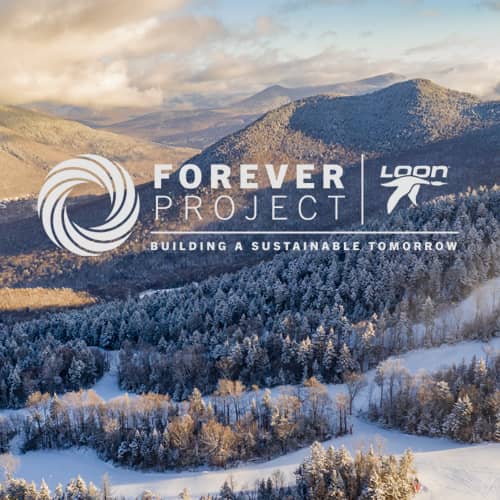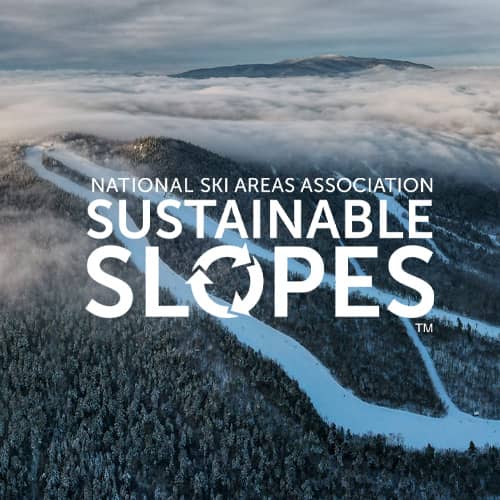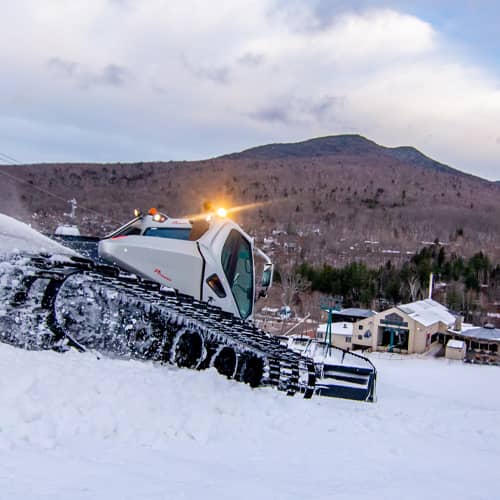How Loon Operates in the White Mountain National Forest
Loon is located in New Hampshire’s White Mountain National Forest. Going beyond mountain adventure— Loon is committed to being a responsible partner in the National Forest. A national forest is a tract of land owned and managed by the federal government for multiple public uses. The White Mountain National Forest welcomes millions of visitors every year and is managed for many different purposes including wildlife habitat, forest products, clean water, and recreation.
When New Hampshire Gov. Sherman Adams wanted to build Loon Mountain Resort on National Forest land in the 1960s, he needed to obtain a special use permit from the U.S. Forest Service to do so. While Loon’s current special use permit runs through 2054, working together with permit administrators is essential to ensure many projects, from crafting new trails to installing lifts, aligns with the National Forest's mission: to sustain the health, diversity, and productivity of the Nation's forests and grasslands to meet the needs of present and future generations. This close collaboration allows Loon to create an enjoyable resort experience that respects the natural beauty and resources of the White Mountains.
Minimizing Impact
The White Mountain National Forest was established in 1918 and has endured a challenging past. Though once ravaged by logging, clear cuts, and fires, the forest’s resilience has led to a remarkable recovery over the past century. Loon has a deep and long-standing commitment to continue taking care of it.
Choosing the Right Stuff:
When maintaining the trails, materials that support the forest's health, including specific grass seed and hay are specifically chosen.
During summer and fall, when mountain biking takes center stage, trail construction minimizes carbon footprint by using on-site resources. Loon’s trail crew strategically digs pits, called borrow pits, outside the planned trail path. The removed material is then used to build the finish trail tread. Once finished, the pits are backfilled with leftover materials like logs, stumps, and loam soil. This technique keeps all carbon in the forest that it came from.
Expansion with Responsibility
The South Peak expansion project (opened in 2023/24) followed this same philosophy. Some of the cleared wood was chipped and sent to a local biomass plant to be converted to energy while the rest was sent to local mills. Loon also partnered with One Tree Planted, an organization whose mission is to restore forests, create habitat for biodiversity, and make a positive social impact around the world. For each tree that was removed from property, more were planted. Loon has donated to this organization which is one of the U.S. National Forest’s official reforestation partners.
Coexisting:
The White Mountain National Forest is home to a diverse range of wildlife. Loon recognizes this, and when undertaking projects, appropriate steps are taken to minimize disruption and ensure operations coexist peacefully with the creatures who call these mountains home.
Cleaning the Kancamagus Highway
Loon is proud to participate in the Sponsor-A-Highway program to help maintain the surrounding environment and community. Each year, team members roll up their sleeves for the annual Kancamagus Clean Up. Together a significant amount of waste is removed from the White Mountain National Forest.

ForeverProject
Committed to a goal of reducing carbon emissions to net zero by 2030

Sustainable Slopes
An active participant in NSAA’s Sustainable Slopes, promoting environmentally responsible operations across the ski industry.

Guest Engagement
Provide resources for guests and staff that support their environmentally conscious decisions.

Maximize Every Minute
Snowmaking
Further advance snowmaking systems to increase productivity and lower consumption—delivering more snow, with less energy.

fleet efficiency
Grooming
Utilize highly efficient snowcats and cutting-edge GPS technology to reduce emissions and lower fuel consumption.

Habitat Conservation
Mountain Biking
Adhere to guidelines of state and federal agencies to ensure our practices focus on preserving our ecological resources.